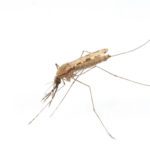Link to Pubmed [PMID] – 11437831
Cell. Microbiol. 2001 Jul; 3(7): 449-58
Understanding the interactions between the most deadly malaria parasite, Plasmodium falciparum, and its main vector, Anopheles gambiae, would be of great help in developing new malaria control strategies. The malaria parasite undergoes several developmental transitions in the mosquito midgut and suffers population losses to which mosquito factors presumably contribute. To identify such factors, we analysed An. gambiae midgut transcripts whose expression is regulated upon ingestion of invasive or non-invasive forms of P. falciparum using a differential display approach. Sixteen cDNA were studied in detail; 12 represent novel genes of An. gambiae including a gene encoding profilin. Four transcripts were specifically regulated by P. falciparum gametocytes (invasive forms), whereas the others were regulated by either non-invasive or both non-invasive and invasive forms of the parasite. This differential regulation of some genes may reflect the adaptation of P. falciparum to its natural vector. These genes may be involved in the development of P. falciparum in An. gambiae or in the defence reaction of the mosquito midgut towards the parasite.


